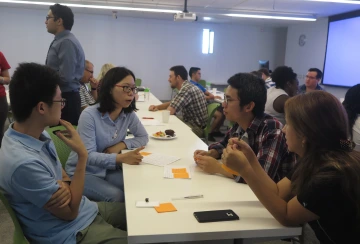The 2019 SBAR Retreat will be offering something new and exciting for participating graduate and undergraduate students. Join the fun!
What is InFO?
InFO is an academic challenge that engages students in multi-disciplinary collaboration, ideas exchange, and investigation that ultimately leads to proposing a creative solution to an SBAR need and big question.
How does it work?
Graduate and undergraduate students registered for the SBAR Retreat are assigned to interdisciplinary teams. On the morning of Thursday, 12 September, all teams will be presented with the same challenge scenario and set of questions to work through. Teams and their designated facilitator will meet Thursday afternoon and Friday morning with their work groups with the goal of designing a unique deliverable to present at the Face-Off competition on Friday afternoon.
All team members will be asked to arrive prepared by reviewing the pre-reading materials provided below. Participants must be present at both work sessions and Friday's Lunch/Face-Off Competition.

What's in it for me? (Benefits)
- A deeper appreciation and understanding of the process in which professionals from varying disciplines work together toward a common goal.
- Networking with fellow students from various disciplines from SBAR partnering institutions.
- A change to learn something new.
- An opportunity to hone your speaking and presentation skills.
- Lunch
- ...and of course... Title of "Winner!"
What do I need to do now?
- Students should complete and submit the RSVP Registration Form for the SBAR Retreat. Completed registration information will be used to assign interdisciplinary teams.
- Each participant should read the pre-reading materials provided below prior to attending the SBAR Retreat.
Retreat Reference Materials
-
Document
SBAR InFO Pre-Reading Materials
- Fourth National Climate Assessment. Chapter 25: Southwest
- United States Department of Agriculture – National Agricultural Statistics Service (2017 Census of Agriculture)
- Reference Paper: Dettinger, M.; Udall, B; Georgakakos, A. 2015. , 25(8). pp.2069-2093
- Jones, G.E.; Garforth, C. 1998. Chapter 1 – The History, Development, and Future of Agricultural Extension. In: Improving Agricultural Extension: A reference manual. Swanson, B.E.; Bentz, R.P.; and Sofranko, A.J. (eds). Food and Agriculture Organization (FAO) of the United Nations, Rome.

